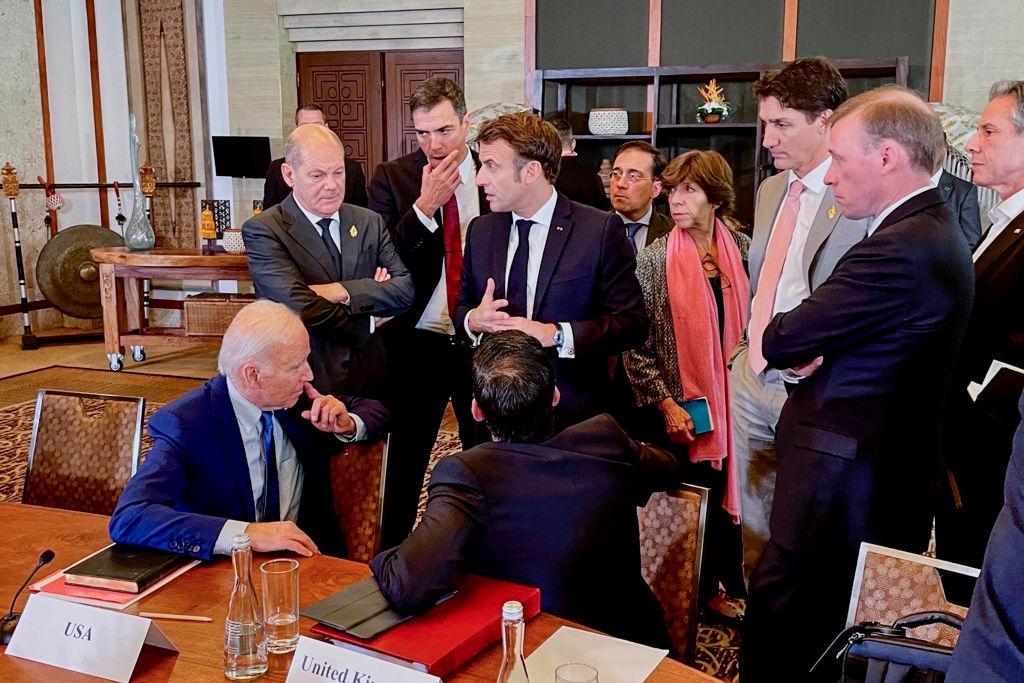Peak Atlantic unity?
Posted By Mark Leonard on November 17, 2022 @ 11:00

European leaders are breathing a huge sigh of relief following the Republicans’ failure to achieve a ‘red wave’ in the US midterm elections. While the final composition of the House of Representatives remains unknown, the Democrats have held on to the Senate, and it is already clear that Congress will not be flooded with isolationist supporters [1] of former president Donald Trump and Russian leader Vladimir Putin. But rather than using this time to celebrate, Europeans need to prepare for the next potential storm.
Europe, after all, has benefited from an extraordinary moment of transatlantic unity over the last year. The US-European partnership has responded seamlessly to Russia’s invasion of Ukraine with coordinated sanctions, and with the US consulting European governments before pursuing any conversations about the future of European security with the Kremlin. NATO, the alliance that French President Emmanuel Macron [2] called ‘brain dead [3]’ in 2019, is now thriving and poised to welcome Finland and Sweden as new members. And Europeans are finally spending more on defence, with even Germany hitting the long-promised target of 2% of GDP [4].
Americans and Europeans also generally agree about the strategic challenge that China poses, especially now that Chinese President Xi Jinping, who has ruled with economic threats and belligerent foreign policies, has extended and consolidated his power. There is a strong sense that ‘the West is back’. The US and Europe are channelling a newfound political unity in support of shared values and a common vision of the kind of world they want.
But storm clouds are already gathering. In the short term, a Republican-controlled house may still try to push back on the idea that America should cover a disproportionately large share of the costs for Ukraine’s defence. As my European Council on Foreign Relations colleague Jeremy Shapiro notes [5] in a recent commentary, the US has pledged US$24 billion in military aid for Ukraine, whereas Europe has committed [6] only half that. Why should Americans pay more than Ukraine’s own neighbours?
And in the longer term, debates about how to define a Ukrainian victory could create new tensions. While the Biden administration, France and Germany note that there will need to be peace negotiations at some point, Poland and the Baltic states have made clear that they want to see Russia humbled. Meanwhile, Trump has nominated himself [7] to broker a deal between Russia and Ukraine.
There are also tensions bubbling beneath the surface when it comes to China. While the transatlantic allies are all moving in the same direction, that does not mean they are aiming for the same destination. German Chancellor Olaf Scholz, for example, recently visited Beijing [8], where he showed little interest in decoupling the European and Chinese economies (though he does fully acknowledge the dangers of excessive dependence).
Europeans have also been spooked by the protectionist considerations underpinning the US CHIPS and Science Act, Inflation Reduction Act and Commerce Department’s decision to restrict cooperation in high-tech sectors. The Inflation Reduction Act all but closes the American electric-vehicle market even to companies from allies such as Europe, Japan and South Korea. Europeans are rightly worried that they will become collateral damage in America’s economic war on China—and they have yet to be called on for diplomatic support regarding Taiwan.
But the biggest dangers still come from US domestic politics. Many commentators have asked if the Republicans’ relatively weak midterm performance signals the end of Trump’s control of the party. Not only did many Trump-endorsed candidates fail, but Florida Governor Ron DeSantis, one of the leading contenders for the Republican presidential nomination in 2024, won re-election in a landslide [9]. DeSantis is popular, but if he challenges Trump, he may end up sharing the same fate as Jeb Bush and all the others whom Republican primary voters rejected in 2016.
More important, Trumpism is not dead. Republican candidates will continue to pursue scorched-earth culture wars and embrace Trumpian positions against free trade, immigration, foreign intervention and Europe. And given the deteriorating state of the global economy, the conditions may be ripe for the Republicans to fare better in the next election, especially if they learn from their mistakes in 2022.
For all these reasons, Europeans need to use the next two years to reduce their dependence on the US. If Biden runs again and wins, a more self-sufficient Europe can serve as a much better partner to the US. But if Trump or some other Eurosceptic figure is elected, Europeans at least will be better positioned to weather the storm. With just two years to erect effective defences against a future red wave, it’s time for Europeans to build their own kind of wall.
Article printed from The Strategist: https://aspistrategist.ru
URL to article: /peak-atlantic-unity/
URLs in this post:
[1] isolationist supporters: https://www.ft.com/content/fd870fa9-007a-4cd4-bffc-d72aa2a35767
[2] Emmanuel Macron: https://www.project-syndicate.org/columnist/emmanuel-macron
[3] brain dead: https://www.economist.com/europe/2019/11/07/emmanuel-macron-warns-europe-nato-is-becoming-brain-dead
[4] 2% of GDP: https://www.reuters.com/world/europe/germany-must-meet-natos-2-spending-target-over-long-term-defence-minister-2022-09-12/
[5] notes: https://ecfr.eu/article/the-coming-transatlantic-rift-over-ukraine/
[6] committed: https://www.ifw-kiel.de/publications/data-sets/ukraine-support-tracker-data-17410/
[7] nominated himself: https://www.businessinsider.com/trump-offers-lead-group-to-mediate-peace-russia-2022-9
[8] visited Beijing: https://www.cnn.com/2022/11/03/business/germany-china-olaf-scholz-visit-trade
[9] won re-election in a landslide: https://www.theguardian.com/us-news/2022/nov/09/ron-desantis-trump-2024-florida-midterms
Click here to print.